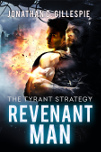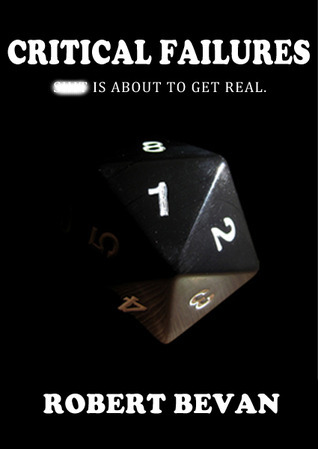Review: Critical Failures, by Robert Bevan
November 20, 2013 in General Topics
This book spends a lot of time in said bathroom. Bevan answers the truly burning questions in the fantasy genre, such as “How badly does an orc’s feculence stink?” and “What god does a Dwarven cleric pray to when he forgot to designate one?” As you might guess, this one’s not for kids by any stretch of the imagination–the profanity comes early and often.
Tim, Julian, Dave and Cooper are four friends that seek to assuage their day of boredom working at a local chicken restaurant with a game of “Caverns and Creatures”, the book’s stand-in for the pen-and-paper RPG we all know and love. Said game will be run by a “Cavern Master” named Mordred, who has a fragile ego, only a loose connection to reality, and a bag of magical dice. Having him meet the exceedingly-caustic Cooper creates a situation as stable as a Soviet nuclear reactor.
So of course the DM melts down. Our heroes are thrown into the gaming world itself. It isn’t a soft landing, either–no sooner have they arrived than they find themselves pursued by local authorities, because Cooper took it upon himself to have his previously paper-only character lop off the head of a likewise paper-only guard. Tim (in this world a halfling rogue) is promptly captured, and our heroes are under pressure to concoct a rescue plan while also grappling with the fact that failure in this very real environment can lead to their very real deaths.
This setup produces some snags. In striving to balance comedy, action, and suspense, the book sometimes missteps over its own tone. Long tracts are devoted to the characters springing themselves from very dangerous situations, and often these don’t have a trace of mirth in them, so it’s easy to forget what you’re reading is–I think–intended to be light-hearted. Then you’re suddenly in a scene where the characters are laughing out loud at the most banal of events.
I found that somewhat disjointed. Being stuck in a fantasy world should be much more damaging and depressing for our protagonists, and yet the book needs them to shake much of it off and produce humor, and so they do. Then in the next moment it’s imploring us to believe that everything is at stake, that the heroes are completely, deadly serious due to some emergency, and we should be too. It’s a bit of a seesaw effect on our nerves, and I wasn’t always a fan of it.
I’m not saying the book isn’t a delightful read–it very much is. But the effect is a bit like if Ash in the Army of Darkness stumbled across a recently-slain child, then in the next scene was back to his regular antics. Wouldn’t that be a bit of a buzz kill?
The combat scenes suffer a bit from this disjointedness, but the worst symptoms of this malady involve Mordred. What that psychopath has done to these guys isn’t a laughing matter. He’s deprived them of all the rest of their years, and consigned them to existence in a world of absolute, unending danger. Nothing will ever be the same, and Bevan doesn’t spend enough time explaining how our characters can just write that off and walk away. If you were ripped away from everyone and everything you loved, how would you process that? Would you find yourself having an almost casual conversation with the person that did that to you?
Where Bevan hits better notes, I think, are when Critical Failures relishes in its bread and butter contemporary fableau strongpoints, and doesn’t try to be more than the enjoyable tongue-in-cheek romp that it is. Cooper is every bit suited to life as a half-orc barbarian, full of insults and brash decisions, and the characters’ slow discovery of their latent abilities is handled with an amused eye for the idiosyncrasies of the “game’s” rules and the quirky tendencies of its most strident players. How does one speak in Elven, for example? Adopt an English accent. Being a gifted musician and troubadour? Here, it’s a fate worse than death.
No one is safe from sarcasm, and that includes animal familiars, local peasants, and even the fantasy-staple critters that populate the text.
Those creatures, by the way, are realized in vibrant fashion by Bevan. As much as I sometimes took issue with the scenes taking place involving multiple strangers or interior environments (I couldn’t always understand exactly what was going on), Bevan writes creepy crawlies with an absolute eye for how they would function in a fantasy world’s ecosystem. Every dangerous beast that he brings within weapons range of our heroes is described with an almost naturalist’s eye for realistic behavior, and this ramps up the sense of urgency and dread I experienced when reading about them.
I had some additional, minor points of complaint. One is the inconsistent setting–the village waxes from a medieval-like setting to almost pan-Victorian. Further, the bulk of the book’s action basically takes place in two areas: the woods, and the prison, and that’s it. I get that Bevan is setting things up for further adventures, but it would have been nice to see more of this world in this first book.
Grammarians take note–I’m raising the red flag on editing. It’s probably something Mr. Bevan will address in a later revision, but this book really needs a pro-level editor. The mistakes never kept me from wanting to read the rest of the story (I was enjoying it), but they were there. I’m very forgiving of this sort of thing, but many readers won’t be.
It’s worth noting that at the time I picked up Critical Failures, it was free on the Amazon storefront in Kindle format. But I think it’s easily worth $2.99 or even more, and I want to stress that if you’re showing up for laughs, you’ll probably feel like you got your money’s worth. There were more than a few times that I almost lost control of myself in a public venue reading it.
Though the book isn’t for everyone, if you have any background at all with fantasy RPG’s–particularly the variety that take place over beer and pretzels at ten o’clock on a Friday night–then this book is an absolute no-brainer. Don’t let my feedback to the author stop you, just go get your copy.
And for goodness sake, never roll giant black D20’s.
Rating: 3/5 stars.


Recent Discussion